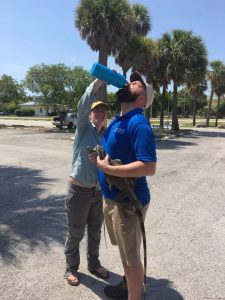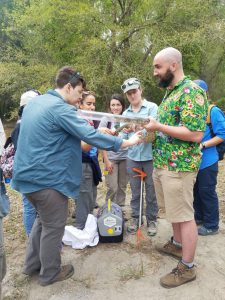WEC MS student Colin Goodman successfully defended his thesis entitled “The Potential for Spread of a Novel Invader, The Tropical Clawed Frog, in Florida” and received an MS degree in summer 2020. Colin was advised by Dr. Christina Romagosa.


Where are you from and where did you receive your previous degrees?
I am from Maryland, and I received my BS from the University of Maryland, majoring in environmental science and policy.
When did you become interested in wildlife ecology or conservation?
I have had an interest in wildlife since I was a child. However, my interests in research did not really begin to take shape until later in my undergraduate career.
Why did you decide to come to WEC?
There are too many reasons to mention here, but I will say one of the biggest reasons is because of my advisor, Dr. Christina Romagosa. Not only was I interested in invasive species, but everybody I spoke to that knew of her had spoken very highly of her.
What did your research focus on?
My research focused on examining dispersal, and individual differences in dispersal-related traits, in a non-native frog species (tropical clawed frog, Xenopus tropicalis).
Why did you choose to study that particular topic?
I tend to gravitate towards questions with both applied and theoretical grounding. Invasions offer a great opportunity to do just that. Specifically, I wanted to examine traits that might directly impact a species’ ability to successfully invade novel areas.
What was your most memorable experience at WEC?
I would have to say the Ordway camping trip for the wildlife techniques course was my most memorable experience. The trip consists of a crash course in various genres of field research, from sampling pond-breeding amphibians, to catching bats, to tagging alligators. Although these activities are in and of themselves enough to be memorable, as a TA, it is all the more enjoyable to get to watch undergraduates participate.
How have your advisor(s) shaped your experience and research?
Dr. Christina Romagosa really helped me to think about how to frame scientific questions in a coherent way. Further, she really emphasized the importance of building professional networks in graduate school. I think that both of these helped me immensely with respect to my career goals.
What are your plans moving forward?
I will be starting a Ph.D. in the Department of Integrative Biology at the University of South Florida. I will be in the Deban Lab, which predominately focuses on the biomechanics of amphibian locomotion.
How do you feel that WEC prepared you for your next steps?
Because of the faculty, coursework, and unseen assistance and guidance by the staff at WEC, I feel far more prepared to take on a Ph.D. and an inevitable career in this field.
 0
0
